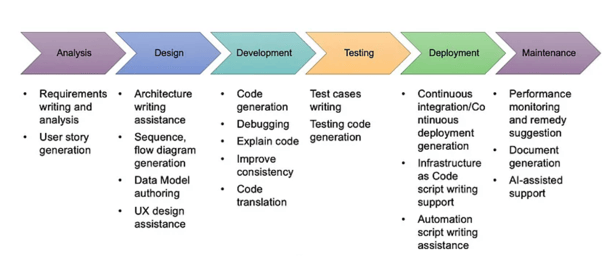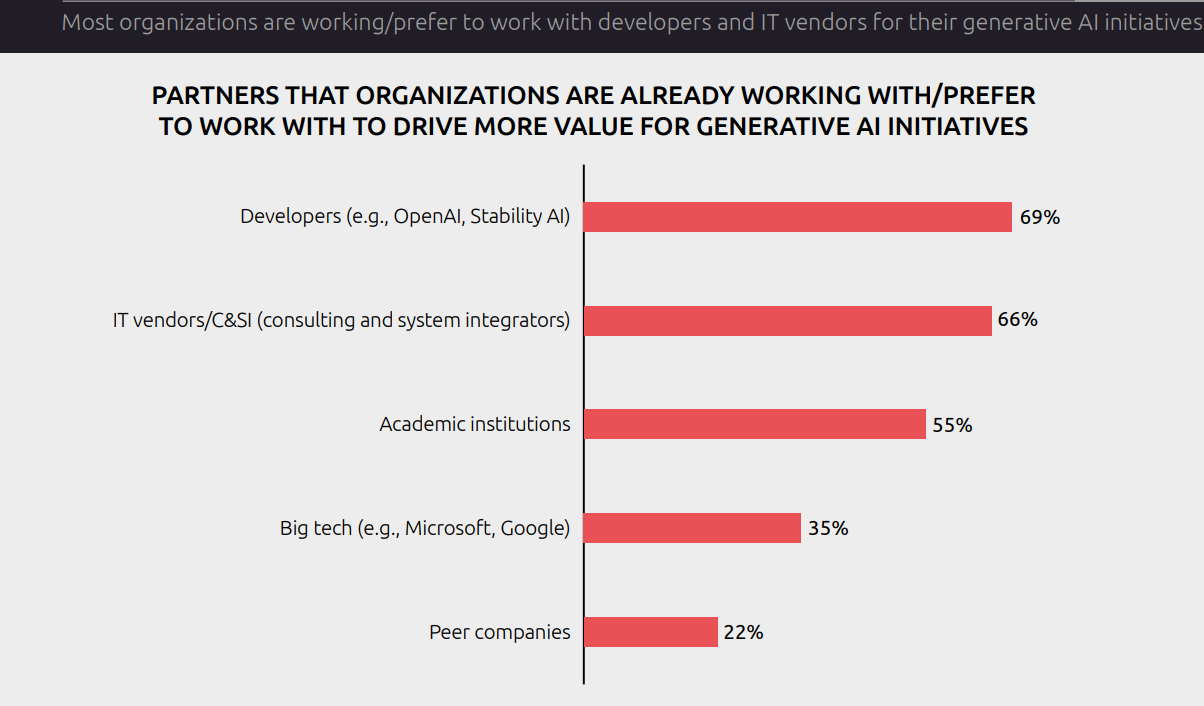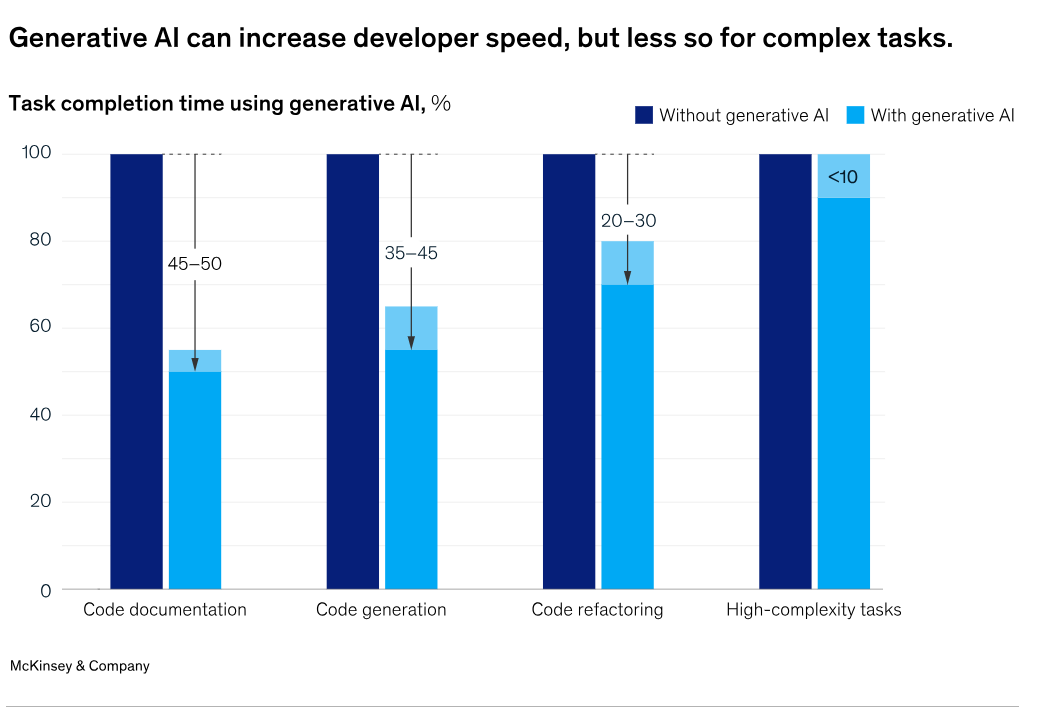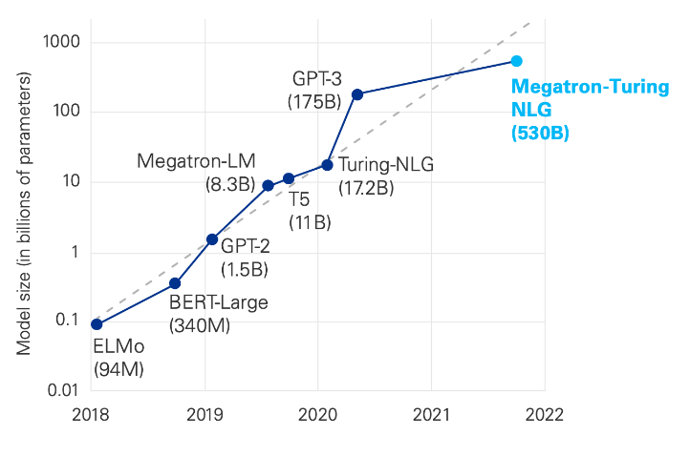The Generative AI in B2B SaaS and professional services.

Technology has been captivating the world for generations. From the Lisa, the early Apple computer that reshaped personal computing with its graphical user interface, to the groundbreaking moment of first exploring the internet, the introduction of smartphones, and the evolution of artificial intelligence. Today, we stand at the forefront of progress, harnessing large language models (LLMs) and generative AI to further expand the boundaries of innovation, particularly within the AI B2B SaaS landscape.
In this blog, let’s dig deeper on how Generative AI is adding value to the software industry and professional services.
The Potential of Generative AI on Software Development Life Cycle

Generative AI in SDLC, SOURCE
In simple language, developers can articulate the desired functionality of new software, and then witness as generative AI transforms their concepts into functional code. Andrej Karpathy, from OpenAI, said “the hottest new programming language is English,” capturing the significance of this breakthrough, especially relevant to the rise of AI B2B SaaS platforms.
Generative AI boasts remarkable capabilities that seamlessly integrate into the entire software development life cycle (SDLC). This encompassing integration spans from initial business needs analysis and Agile user story creation to software design, coding (including retrospective documentation), packaging, deployment, testing, and continuous monitoring. It enhances and streamlines the myriad tasks performed by software engineers and AI B2B SaaS developers alike.
Focus On the Value of Generative AI for Developers

Source Below
According to a study Capgemini, the top choices for preferred partners in generative AI initiatives include developers, favoured by 69% of respondents, followed closely by IT vendors and consulting firms at 66 %.
Over a decade ago, Marc Andreessen, General Partner of Andreessen Horowit, famously declared that "software is eating the world." Today, the landscape of software development is undergoing a profound transformation driven by generative AI (GenAI), fundamentally reshaping how large corporations and AI B2B SaaS providers operate.
GenAI’s influence extends across multiple domains, enhancing the proficiency and agility of software developers while empowering business users to create prototypes efficiently. GenAI also democratizes data access by comprehending information from diverse sources and automating data preparation, organization, and management. Moreover, it reduces software implementation costs by offering cost-effective updates to legacy code, facilitating seamless transitions to cloud-based AI B2B Saas solutions and comprehensive process automation. Notably, GenAI's rapid emergence is setting unprecedented benchmarks for speed and impact across various industries.

Source Below
According to IBM, “On average, 87% of executives expect job roles to be augmented, rather than replaced, by generative AI”. Generative AI excels at automating routine tasks within coding, including auto-filling standard functions, completing coding statements as developers' type, and documenting code functionality in predefined formats based on developer prompts. By doing so, these tools empower developers to shift their focus towards tackling intricate business challenges and expediting the creation of novel software capabilities within AI B2B SaaS environments.
Generative AI can help:
- Efficiently bring on board significant numbers of developers to expedite the introduction of new features or significant software changes. These developers can swiftly become productive and necessitate less guidance from the current developer team.
-
Reduce corporate dependence on developers responsible for their legacy codebase by incorporating more of that legacy knowledge into a refined generative model.
-
Language modelling: It can be fine-tuned to generate text in a specific style or domain, such as technical writing, academic research, or creative writing.
-
Expediting Code Updates: A research by McKinsey found out that participants noted that by effectively prompting AI tools, they were able to swiftly make extensive changes to existing code. For example, to reduce time spent on code adaptation from online libraries or enhancing prewritten code, developers would paste it into a prompt and submit queries for the tool to adjust based on their specified criteria.
Generative AI for the Knowledge Worker
In a recent press release, Bain & Company announced the extension of its collaboration with OpenAI, marking a significant milestone in their commitment to harnessing advanced AI technologies. Over the past year, Bain has seamlessly integrated OpenAI's cutting-edge solutions into its internal knowledge management systems and research processes, resulting in enhanced operational efficiency. Manny Maceda, Bain's worldwide managing partner, emphasized the transformative power of AI, describing it as an industrial revolution for knowledge work that will prompt clients across various industries to reimagine their business architectures.
Bain's proactive adoption of this technology not only strengthens its own capabilities but also sets a high standard for clients seeking to navigate the evolving landscape of AI-driven solutions. Looking ahead, the alliance is poised to explore innovative initiatives, including the development of next generation contact centres for retail banks, telcos, and utility companies. These initiatives aim to elevate customer experiences through automated, personalized, and real-time scripts, as well as bolster marketing efforts with highly tailored ad content, compelling imagery, and precisely targeted messaging.
Similarly, Erik Roth, a senior partner at McKinsey, who leads the development of: Lilli”, their in-house generative AI solution, and the integration of Gen AI technologies into their operational framework, emphasizes the transformative potential of this platform. He notes that Lilli consolidates the firm's knowledge and capabilities into a single, accessible space for the first time, enabling McKinsey teams to allocate more time to activate insights, offer recommendations, and optimize the value they provide to clients. With Lilli's support, engagement teams can focus on problem-solving, coaching, skill development, and assisting clients in reaching their desired performance milestones. This marks a significant leap forward in McKinsey's commitment to enhancing client interactions and delivering unparalleled value.
These collaborations represent a bold stride toward a future where AI-driven innovation reshapes the business landscape. Addressing a user's comprehensive requirements often entails drawing upon information from various corners of your organization, and quite possibly, extending beyond your established boundaries. This challenge looms large not only for many applications but also for most IT departments. Generative AI consolidates a company's knowledge and capabilities into a unified repository, enabling us to devote more quality time to our clients. This empowers us to put insights and recommendations into action, ultimately maximizing the value we can deliver. Based on Accenture research 40% of all working hours can be impacted by large language models (LLMs) like GPT-4.
Generative AI tools exhibit exceptional prowess in data management and have the potential to complement existing AI-driven tools. The strategic application of generative AI in these areas represents a significant stride toward seamless application integration throughout an entire enterprise ecosystem. Even new hires can effortlessly search for the most pertinent research documents and pinpoint the right experts—a task that can often be daunting for those newly joining a company. It also helps in reducing corporate dependence on developers responsible for their legacy codebase by incorporating more of that legacy knowledge into a refined generative model. Generative AI revolutionizes routine and lower-value daily tasks by automating them seamlessly. For instance, Microsoft Copilot holds the potential to reshape the way we handle email correspondence, generate Word documents, craft presentations, and visualize data, promising a significant leap in efficiency and productivity.
Generative AI can help you with:
-
Summarization: Generative AI can summarize long pieces of text into shorter, more concise summaries.
-
Text generation: Generative AI can generate natural-sounding text in a variety of contexts, such as essays, stories, poems, and even computer code.
-
Text classification: It can classify text into different categories based on content, such as news articles, product reviews, or social media posts.
-
Text completion: It can predict the next word or phrase in a sentence or paragraph, making it useful for tasks such as autocomplete and autocorrect.
-
Natural Language Processing (NLP) accelerates the pace of research and enhances knowledge retrieval. NLP has the capacity to swiftly analyze extensive volumes of information, uncovering subtle patterns that could elude even the most attentive human analyst.
Case Studies of Companies Leveraging Generative AI
McKinsey: McKinsey has unveiled "Lilli," their in-house generative AI solution designed exclusively for their colleagues. This innovative platform serves as a centralized hub, streamlining the search and synthesis of the vast knowledge repository within the firm. Lilli's primary objective is to expedite the delivery of McKinsey's most valuable insights to clients efficiently and impartially.
Bain and OpenAI: Bain & Company has unveiled a strategic services alliance with OpenAI, aimed at assisting enterprise clients in uncovering and maximizing the boundless possibilities of AI. Manny Maceda, Bain & Company’s worldwide managing partner, said: “By collaborating with OpenAI, we’re delighted to have unmatched access to state-of-the-art foundation AI models, so that we can create tailored digital solutions for our clients and help them realise business value.”
Atlassian: In April 2023, Atlassian, the software company, announced an ongoing partnership with OpenAI. Atlassian aims to leverage the capabilities of the GPT-4 language model to enhance various aspects of its operations.
One notable improvement will be in Atlassian's Jira Service Management, which handles tech support inquiries within Slack. By integrating GPT-4, the system will deliver faster and more efficient results for employees.
Additionally, Atlassian's Confluence collaboration program is set to experience significant advancements through this collaboration. For instance, users will have the ability to click on unfamiliar terms in documents to receive instant, automatically generated definitions, improving overall productivity and comprehension.
NVIDIA: NVIDIA AI Workbench is a unified, user-friendly toolkit designed for swift development, testing, and customization of pretrained generative AI models on a PC or workstation. These models can subsequently be scaled to accommodate various environments, including data centers, public clouds, or the NVIDIA DGX™ Cloud. Manuvir Das, NVIDIA's Vice President of Enterprise Computing, emphasized that the NVIDIA AI Workbench streamlines the process for cross-organizational teams to craft the AI-driven applications now integral to contemporary business operations.
The Imperative of Risk Control
 Source Below
Source Below
The potential of generative AI models is exponentially growing. This graphic by KPMG illustrates the evolution of model size in billions of parameters for key generative AI models introduced since 2018. However emerging risks tied to generative AI, such as data, intellectual property, and regulatory concerns, must be addressed. As companies embrace generative AI, ensuring robust risk controls becomes imperative.
As an enterprise, you are very mindful of GDPR, security and ethics. It is important to leverage the best Generative AI services that are designed with compliance, privacy, and security in mind.
Managing The Risks of Generative AI
 To fully harness the immense potential of this pioneering technology, it is imperative to proactively address the extensive spectrum of risks it presents, considering the holistic perspective of the business. These risks include privacy concerns, cybersecurity threats, regulatory compliance challenges, intricacies of third-party relationships, legal obligations, and safeguarding intellectual property, all of which have already manifested themselves as pressing issues.
To fully harness the immense potential of this pioneering technology, it is imperative to proactively address the extensive spectrum of risks it presents, considering the holistic perspective of the business. These risks include privacy concerns, cybersecurity threats, regulatory compliance challenges, intricacies of third-party relationships, legal obligations, and safeguarding intellectual property, all of which have already manifested themselves as pressing issues.
While every executive and user within the organization plays a pivotal role, it is these key C-suite leaders who will spearhead the responsible adoption of AI:
For Chief Information Security Officers, GenAI introduces new vulnerabilities, potentially enabling more sophisticated threat actors and raising immediate concerns about advanced phishing attempts and the creation of convincing, custom lures.
Chief Data Officers and Chief Privacy Officers must address data and privacy risks, considering the vast datasets and new data generated by GenAI, while also guarding against unauthorized access and data loss.
Chief Compliance Officers need to adapt to the evolving regulatory landscape that governs GenAI, ensuring that the organization stays in compliance with new and existing regulations.
Legal teams, led by Chief Legal Officers, are tasked with governance and supervision to prevent legal risks. Lax data security measures could expose trade secrets and customer data, while failure to review GenAI outputs rigorously may result in compliance breaches, copyright infringements, and reputational damage.
Internal Audit Leaders will need new methodologies and skill sets to audit GenAI systems effectively, and Chief Financial Officers and Controllers must mitigate financial risks, particularly the risk of erroneous financial reporting that could damage trust with stakeholders.
In this era of Generative AI, establishing an effective governance strategy is paramount. This strategy will involve not only those directly involved in AI development but also a diverse array of individuals both inside and outside the organization. Balancing innovation with responsible use is the cornerstone of building trust with customers, investors, business partners, employees, and society at large.
Conclusion
The excitement and anticipation among executives regarding the potential impact of Generative AI on their businesses is nothing short of extraordinary. In a recent study conducted by Accenture, a staggering 96% of high-tech executives expressed either a very high or extremely high level of inspiration when confronted with the groundbreaking capabilities presented by AI foundation models. This overwhelming enthusiasm reflects the profound belief in the transformative power of Generative AI in AI B2B SaaS and sets the stage for a thrilling era of innovation and growth.
While the potential of technology is undeniably remarkable, many businesses find themselves grappling with the challenge of determining how and where to effectively apply it. It's not that identifying use cases is a problem – there are numerous opportunities. Instead, the stumbling blocks often lie in discerning which ones align with their business objectives and warrant prioritized investment. We invite you to book a demo with us, so we can embark on this essential transformation that is so vital in today's rapidly evolving landscape. Together, we can navigate the path to success.
Let's Get Started!
SOURCES: https://www.accenture.com/us-en/blogs/high-tech/generative-ai https://www.forbes.com/sites/bernardmarr/2023/08/07/generative-ai-in-business-why-accenture-is-investing-3-billion-in-ai/?sh=15bb23d9595a https://www.capgemini.com/solutions/generative-ai-for-software-engineering/ https://advisory-marketing.us.kpmg.com/speed/pov-generativeai.html#:~:text=Generative%20AI%20will%20provide%20the,a%20fine%2Dtuned%20generative%20model. https://www.bain.com/about/media-center/press-releases/2023/bain--company-announces-services-alliance-with-openai-to-help-enterprise-clients-identify-and-realize-the-full-potential-and-maximum-value-of-ai/ https://www.capgemini.com/solutions/generative-ai-for-software-engineering/ https://medium.com/mlearning-ai/generative-ai-in-software-development-3e90e466eb91 https://www.mckinsey.com/capabilities/mckinsey-digital/our-insights/unleashing-developer-productivity-with-generative-ai https://www.pwc.com/us/en/tech-effect/ai-analytics/managing-generative-ai-risks.html https://www.consultancy.com.au/news/6737/bain-company-inks-alliance-with-chatgpt-creator-openai https://techmonitor.ai/technology/companies-partnered-with-openai https://www.bcg.com/publications/2023/how-cio-can-leverage-gen-ai-for-software-development https://prod.ucwe.capgemini.com/wp-content/uploads/2023/07/GENERATIVE-AI_-Final-Web-1-1.pdf



